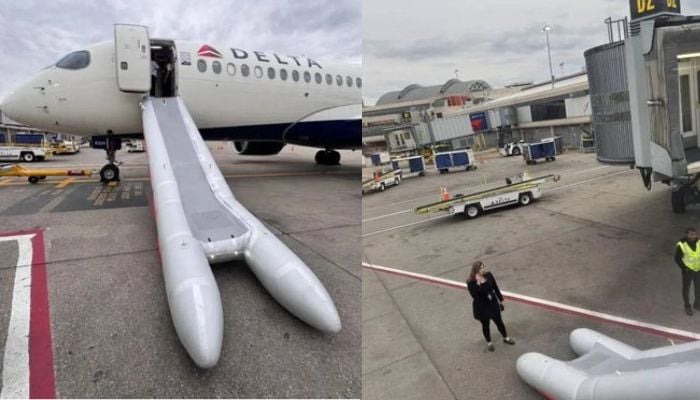How 26-Year veteran's split-second mistake cost Delta Airlines $70,000
Veteran Delta flight attendant’s error triggers $70,000 emergency slide deployment
October 27, 2025

A standard pre-departure check-up became a costly and inconvenient accident for Delta Air Lines when an experienced flight attendant inadvertently triggered an emergency evacuation slide, releasing dozens of passengers and triggering a domino effect of delays that will cost the airline millions.
The accident that occurred on a Saturday evening, October 25, involving an Airbus A220 at Pittsburgh International Airport underscores a well-known, though rare, aviation safety weakness i.e., the Inadvertent Slide Deployment (ISD).
Flight 3248 to Salt Lake City was preparing for pushback when the crew began arming the doors, a standard safety procedure that primes the emergency slides to automatically inflate if the door is opened.
According to the reports, the lead flight attendant was a 26-year veteran who accidentally raised the handle of the 1L door leading to the boarding section.
This single action of system armed set in motion i.e., an irreversible process.
The power-assistance function caused an emergency opening of the door, and the safety system of the multi-million-dollar plane did precisely what it had been developed to do: it threw the slide open within seconds against the waiting jet bridge.
The outcome was an immediate standstill in the operation.
The passengers were temporarily stuck on the plane until ground crews mechanically removed the inflated slide and restored the bridge, which took approximately an hour.
The flight has been postponed by almost 4 hours, resulting in many passengers missing connections in Salt Lake City.
The immediate replacement cost of the slide will cost around $70,000, but the real financial impact will be much greater.
Repacking and inspection of the slide will cost around additional 20,000 dollars.
When the cost of rebooking hotel rooms for ill-connected passengers, crew overtime, and airplane repositioning is added, the entire event would have been a six-figure error.
The interesting circumstance is not only the price but also the level of experience of a crew member. The flustered flight attendant apologized to the passengers, claiming he had not encountered this in his 26-year career.
The accident highlights an ongoing problem in aviation human factors. Although cross-check protocols are pretty stringent, ISDs are not uncommon; Airbus records indicate that it has previously reported up to 3 ISDs per day worldwide, mostly during aircraft disarming after landing.
To counter this risk, other carriers, such as British Airways, have implemented the Japanese "Shisa Kanko," or point-and-call, system, where crew members literally point at controls and confirm by voice. Research indicates this can reduce mistakes by up to 85%.
Until recently, the case in Pittsburgh could be viewed as a graphic example that even in the most automated sector of aviation, the effect of a simple lever press by a long-time professional or not can be enormous and very expensive.











